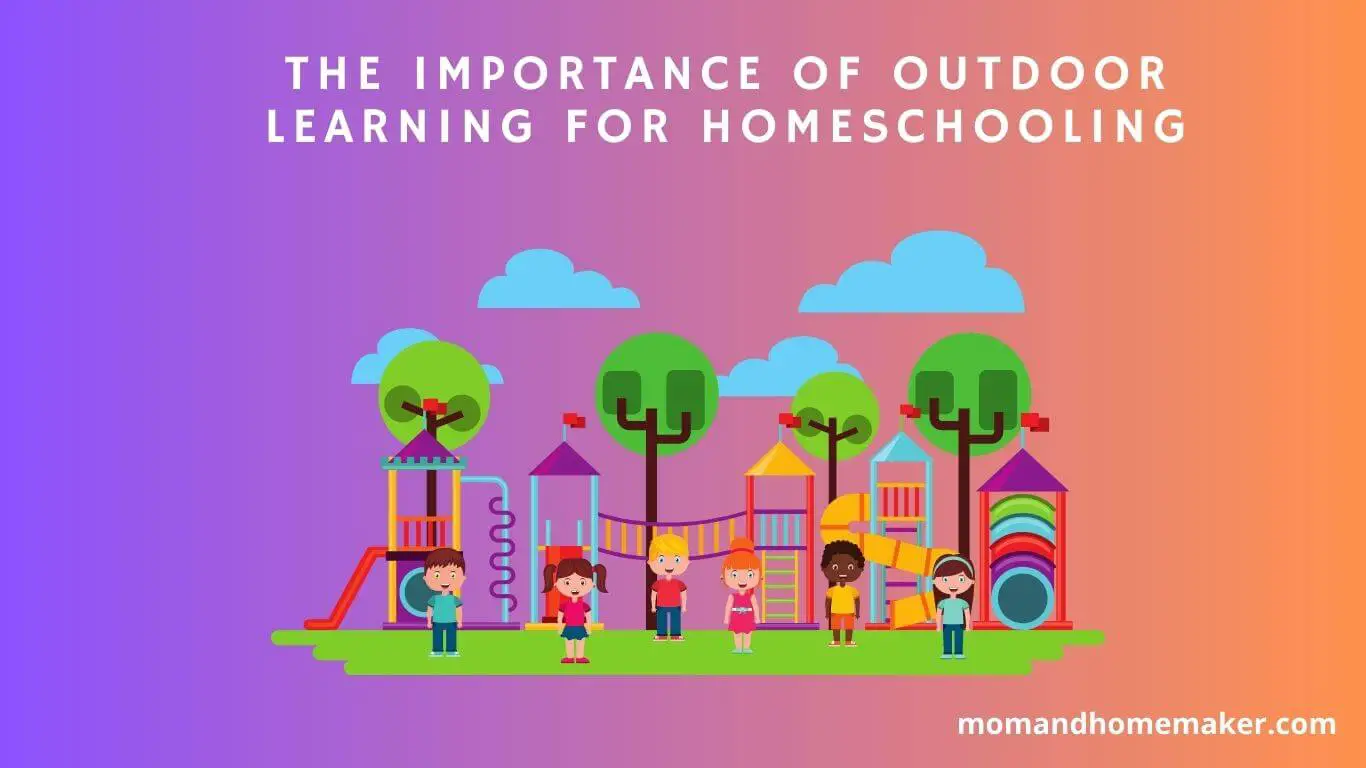Homeschooling is an increasingly popular education option for families that want to take a more hands-on approach to teach their children. While many people associate homeschooling with sitting around the kitchen table or doing worksheets, there are so many other learning opportunities that can be taken advantage of.
One of these methods is outdoor learning, and its importance for homeschoolers cannot be overstated. Outdoor learning can provide students with a unique educational experience that is both fun and engaging.
9 Importance of Outdoor Learning for Homeschooling
1. Personal and Social Development Benefits of Outdoor Learning
Outdoor learning can bring many personal and social development benefits for homeschooled children. It allows children to explore and engage with the natural world and discover their own passions, interests, and strengths.
Outdoor learning offers children the opportunity to develop their skills in problem-solving, decision-making, creativity, communication, and collaboration. As students explore and interact with their surroundings, they also gain confidence in their own abilities and develop a sense of ownership and responsibility for their environment.
In addition to the personal growth that outdoor learning can bring, homeschooled children can also benefit from the social development opportunities it provides. Outdoor learning provides a platform for children to interact with each other, share ideas and work together in a supportive and cooperative environment.
By engaging in activities such as hiking, biking, canoeing, or gardening, children can learn to communicate, collaborate and compromise with each other while they develop social skills such as empathy, respect, and teamwork.
Finally, outdoor learning can also provide students with an understanding of the interconnectedness of humanity, nature, and the environment. Through activities such as observing plants and animals, children can learn about the importance of caring for the environment and how their actions can have a positive or negative impact on their surroundings.
This understanding can help to foster a sense of appreciation and responsibility for the natural world and can lead to a lifelong commitment to protecting and preserving the environment.
2. Increased Environmental Awareness and Sense
Homeschooling can offer a unique opportunity to incorporate outdoor learning into your child’s education. By taking advantage of this opportunity, your child can gain an increased awareness of the environment and their place in it.
Outdoor learning provides a hands-on approach to learning, allowing your child to engage in activities that help them to better understand the world around them. With access to nature, your child can develop a heightened sense of appreciation for their environment, as well as a better understanding of the importance of environmental stewardship.
Outdoor learning also provides physical and mental health benefits, such as improved concentration and enhanced problem-solving abilities. With increased exposure to the outdoors, your child can become more confident in their abilities and more capable of making meaningful connections with the environment.
Outdoor learning can help to foster a sense of community and collaboration, as your child engages with other homeschoolers in various activities. Ultimately, outdoor learning is an important part of homeschooling, as it helps to instill in your child an increased environmental awareness and sense of appreciation for their surroundings.
By spending time in nature, children develop a greater appreciation for the environment and the role they play in sustaining it. This increased awareness can lead to a sense of responsibility and a desire to take action to protect the natural world.
Outdoor learning also provides opportunities for inquiry-based and self-directed learning, allowing children to explore the environment at their own pace and develop their own understanding of the world around them.
3. Inquiry-based and Self-directed Learning in the Outdoors
Outdoor learning is an important aspect of homeschooling. Inquiry-based and self-directed learning in the outdoors offers many benefits to home-schooled students. First, inquiry-based and self-directed learning in the outdoors encourages students to explore the world around them and deepen their understanding of the natural world.
Outdoor learning provides students with the opportunity to observe and interact with living things, explore the environment, and test their hypotheses. This hands-on approach to learning encourages students to develop an understanding of science, nature, and ecology in a way that is not possible in the traditional classroom.
Second, inquiry-based and self-directed learning in the outdoors allows students to take ownership of their learning. By giving students the opportunity to explore the natural environment on their own, homeschooled children are empowered to take responsibility for their education and make choices about what they learn. This helps to foster a sense of self-efficacy and encourages students to take ownership of their learning.
Inquiry-based and self-directed learning is a fundamental aspect of outdoor education. Allowing children to explore and investigate the natural world around them cultivates a sense of curiosity and creativity. By providing children with the freedom to direct their own learning, they can develop a deeper understanding of the world around them.
This approach to education promotes critical thinking and problem-solving skills that are essential for success in the 21st century. By instilling a love of learning through outdoor education, children are more likely to become lifelong learners who are curious and engaged with the world around them.
Furthermore, learning in the outdoors encourages children to take risks, develop independence, and build self-confidence. These traits are essential for personal and social development and will serve students well in all areas of their lives.
4. Promoting Curiosity, Creativity, and a Sense of Wonder
Promoting curiosity, creativity, and a sense of wonder are all important components of outdoor learning for homeschooling. They can help children to explore the world around them, develop problem-solving skills, and to gain an appreciation of nature.
First, promoting curiosity is essential in outdoor learning for homeschooling. Children should be encouraged to ask questions and explore the world around them. This can include asking questions about plants and animals they encounter, researching why certain things happen in nature, and experimenting with different ways of doing activities. By being curious, children can gain a greater understanding of the world and develop a sense of wonder.
Also, fostering creativity is important in outdoor learning for homeschooling. This can include building habitats for animals, creating art with natural materials, and finding new ways to interact with their environment. By encouraging children to express themselves in creative ways, they can learn to think outside the box and develop problem-solving skills.
Finally, promoting a sense of wonder is essential for outdoor learning for homeschooling. Children should be encouraged to appreciate the beauty of nature and to take the time to observe the world around them. This can involve looking closely at plants and animals, noticing changes in the environment, and appreciating their place in the natural world. By promoting a sense of wonder, children can gain an appreciation of nature and develop a connection to the environment.
Overall, promoting curiosity, creativity, and a sense of wonder are important components of outdoor learning for homeschooling. By fostering these qualities, children can develop a deeper understanding of the natural world and gain valuable skills that will serve them throughout their lives.
When children spend time in nature, exploring and discovering new things, they develop a thirst for knowledge and a desire to learn more. The outdoor environment presents endless opportunities for imaginative play and creativity, which stimulate the brain and inspire children to be innovative.
By incorporating outdoor learning into their homeschool curricula, parents can foster their children’s innate curiosity, creativity, and sense of wonder, while simultaneously promoting their personal and social development, environmental awareness, and health.
5. Health Benefits of Outdoor Education for Homeschoolers
Outdoor education is an important part of homeschooling for many reasons, including its health benefits. Taking learning outside can provide numerous physical and mental health benefits for homeschoolers.
One of the most significant health benefits of outdoor education is physical activity. Outdoor activities provide an opportunity for homeschoolers to get physical exercise, something that can be difficult when learning in a traditional classroom setting.
Additionally, being outdoors has been linked to improved concentration and focus, which can help homeschoolers get the most out of their learning experience. Finally, outdoor education has been linked to improved mental health, as being in nature is known to reduce stress and improve mood.
In addition to the physical benefits of outdoor education, homeschoolers can also benefit from the social aspects of learning outside. Outdoor education can provide opportunities for homeschoolers to interact with their peers, as well as to learn how to work together in a group environment. This can be especially beneficial for homeschoolers who may not have the same access to social interaction as their peers who attend a traditional school.
Overall, the health benefits of outdoor education for homeschoolers are clear. Outdoor education can provide physical activity, improved concentration, reduced stress, and social interaction. All of these benefits can help homeschoolers get the most out of their learning experience and can help them lead healthier, happier lives.
There are numerous health benefits associated with outdoor education for homeschoolers. Studies have shown that spending time outdoors can improve mental and emotional well-being, enhance cognitive skills, promote physical fitness, and reduce stress levels. Homeschoolers who participate in outdoor education programs have also shown a greater sense of enthusiasm toward learning and are more likely to remain engaged in educational activities for longer periods of time.
Exposure to natural settings can also help alleviate symptoms of ADHD and anxiety, and increase creativity and problem-solving abilities. By incorporating outdoor education into their curriculum, homeschoolers can reap the many health benefits that come along with it while enjoying a fun, educational experience in nature.
6. Enhanced Range of Children’s Intelligence
Outdoor learning for homeschooling has become increasingly popular in recent years, and with the rise in an enhanced range of children’s intelligence, it is no surprise why. Enhanced range of children’s intelligence refers to the development of their cognitive abilities through the utilization of various learning styles and resources. For homeschooling, this can be especially beneficial, as it allows children to learn in a variety of ways, beyond the traditional classroom setting.
One of the most important aspects of an enhanced range of children’s intelligence is the ability to use outdoor learning for homeschooling. By being exposed to the natural environment, children can learn to observe and interact with the world around them.
This can be especially beneficial for homeschooling, as it allows children to be exposed to new ideas, concepts, and materials in a safe and supportive environment. This type of learning allows children to expand their knowledge, as well as to develop their problem-solving skills.
In addition to the educational benefits, an enhanced range of children’s intelligence also has the potential to promote physical and mental health. Physical activity is known to help reduce stress and anxiety, and can also promote healthy development.
Outdoor learning for homeschooling can provide an opportunity for children to get outside and engage in physical activities, while also staying safe and social distancing. This can be a great way to keep children active and engaged while learning at home.
Additionally, the natural environment can provide a calming and soothing atmosphere that can help children to focus and concentrate on their studies.
Outdoor education also provides opportunities to engage children’s multiple intelligences. Through outdoor play and exploration, children can develop their spatial, kinesthetic, naturalist, and interpersonal intelligence.
By encouraging children to use their imagination, build cognitive skills, and acquire social skills, the outdoor learning environment sets the building blocks in place for well-rounded and holistic child development.
By incorporating outdoor learning into homeschooling, parents can offer their children a valuable opportunity to engage all of their intelligence in the pursuit of knowledge and growth.
7. Developing an Understanding of Nature and the World Around Them
The development of an understanding of nature and the world around them is an important aspect of outdoor learning for homeschooling. Nature provides a wealth of opportunities to explore, learn, and grow.
Not only does it provide an environment that is free from distractions and technology, but it also provides an opportunity to connect with the natural world. Through outdoor learning, a homeschooling student can gain an appreciation for the beauty and intricacies of nature, as well as learn about the environment.
Outdoor learning is an excellent way to foster a connection with nature, as well as develop an understanding of science and the environment. Through hands-on activities, such as planting a garden, collecting rocks, or observing wildlife, homeschooling students can gain an appreciation for the biodiversity of the world around them.
Through exploring and learning about the natural world, students can gain insight into the fragile balance of the environment and how their actions can impact the world. Also, understanding the natural environment can help students to understand the importance of conservation, and how their actions can shape the future of the planet.
Outdoor learning can also provide an opportunity to develop an understanding of the human impact on the environment. By observing the effects of pollution, deforestation, or climate change on the natural environment, homeschooling students can gain an appreciation for how their actions can shape the world.
Through this knowledge, students can begin to develop an understanding of the need for sustainable practices and develop respect for the environment. Developing an understanding of nature and the world around them is a vital aspect of outdoor learning that can help to shape a student’s perspective on the world and their place in it.
As homeschooling parents search for ways to enrich their children’s education experience, outdoor learning is becoming an increasingly popular option. By spending time in nature, homeschoolers can explore and observe natural phenomena, from the behavior of animals to the changes in seasons.
This kind of hands-on learning can be incredibly powerful and can help children build an appreciation and respect for the environment. Ultimately, this understanding can have profound implications for homeschoolers’ lives, as they become more connected to the natural world and become better stewards of the planet.
With outdoor learning, developing a love for learning and encouraging children’s natural curiosity can be achieved in a concrete and meaningful way.
8. Instilling a Love for Learning through Outdoor Education
Outdoor education has the ability to instill a love for learning in children, particularly those who are homeschooled, as it helps to foster a love of learning in children. By taking learning outside of the confines of a classroom, students are able to explore their world and learn about their environment in a more hands-on and experiential way.
This type of learning helps to engage students in their learning and encourages them to think more critically and develop a deeper understanding of the topics they’re studying.
One of the best ways to instill a love for learning through outdoor education is to make learning fun. By incorporating activities that involve the natural world, students can learn while having fun.
For example, students can go on hikes and look for different types of plant and animal species, or they can visit a local park and learn about the local ecosystem. By engaging in these activities, students can gain a greater appreciation for the environment and a deeper understanding of the natural world.
Another way to instill a love for learning through outdoor education is to make learning a collaborative process. By working together with their peers, students can share their knowledge and gain a greater understanding of the topics they’re studying.
Apart from that, by working together, students can gain an appreciation for teamwork and learn the importance of collaboration. Furthermore, group activities can help to foster social skills, such as communication and problem-solving, which are essential for success in life.
By incorporating outdoor education into homeschooling, students can gain a greater appreciation for learning and a deeper understanding of the topics they’re studying. Outdoor education can help to engage students in their learning, providing them with a more meaningful learning experience, while also instilling a love for learning.
When children are given the freedom to learn in a natural setting, they are more likely to develop a sense of curiosity and wonder. This type of inquiry-based and self-directed learning can lead to a deeper level of engagement and understanding of the world around them.
By providing opportunities for hands-on exploration and observation, children are empowered to take ownership of their education, leading to a greater sense of accomplishment and motivation to continue learning.
In addition, the sensory experiences of being outdoors can foster a love and appreciation for nature, instilling values that extend beyond the traditional classroom setting. As more children are homeschooled, it is important to recognize the profound impact that outdoor education can have on their love for learning and personal growth.
9. Building Cognitive and Social Skills in Outdoor Learning Environment
In this section, we explore how outdoor learning can help build important cognitive and social skills in homeschooled children. It provides an opportunity for children to explore their environment and develop cognitive and social skills in a natural setting.
In an outdoor learning environment, children are able to explore and learn on their own, as well as with their peers. This type of learning helps them to develop problem-solving skills and to build relationships with their peers.
Building cognitive skills in an outdoor learning environment is important for homeschooling. It allows children to engage in activities that require problem-solving and reasoning, rather than just memorizing facts.
They can explore the world around them, learn about natural phenomena, engage in activities that require critical thinking, and gain a deeper understanding of their environment. This type of learning is beneficial for homeschooling as it helps the children to gain knowledge and skills that can be applied to other areas of their lives.
In addition to cognitive skills, outdoor learning also helps children to develop social skills. It provides an opportunity for them to interact with their peers and learn how to work together to solve problems. This type of learning helps children to build relationships with their peers, to understand each other’s perspectives, and to communicate effectively. This is an important part of homeschooling as it helps to prepare children for life outside of the home.
Overall, outdoor learning is an important part of homeschooling. It provides an opportunity for children to explore their environment and develop cognitive and social skills in a natural setting. It helps children to gain knowledge and skills that can be applied to other areas of their lives, as well as to build relationships with their peers. Outdoor learning is an important part of homeschooling and should be encouraged.
Through outdoor exploration and natural play, children can learn to problem-solve and think critically, while also developing interpersonal skills such as communication, collaboration, and empathy. Outdoor learning also has the added benefit of encouraging children to take risks and become more self-reliant, which boosts their self-esteem and confidence.
By regularly engaging in outdoor activities, homeschoolers can build a strong foundation of skills that will prepare them for future academic and social interactions, while also fostering a lifelong love for the natural world.
Challenges of Outdoor Learning
Challenges are part of every learning process, and outdoor learning is no exception. One of the most significant challenges of outdoor learning for homeschoolers is ensuring the safety and well-being of their children, especially when exploring new or remote areas.
1. Weather conditions can also pose a challenge, as extreme temperatures, rain, or snow can limit outdoor activities or make them uncomfortable.
2. The lack of resources and accessibility to outdoor spaces may hinder some homeschooling families from incorporating outdoor learning into their curriculum.
3. Lack of Space: Depending on the environment and location, outdoor classrooms may have limited space for activities or projects.
However, with proper planning and preparation, these challenges can be addressed, and homeschoolers can reap the benefits of outdoor education. Homeschooling parents could attend training and workshops to learn outdoor skills or connect with other homeschoolers in their community to share knowledge and resources.
Overall, the challenges of outdoor learning should not deter homeschooling families from exploring the vast benefits that nature can offer to their children’s education and development.
Conclusion
In conclusion, outdoor learning should not be overlooked when it comes to homeschooling. It can provide unique opportunities for fun and education that can’t be found in a traditional classroom setting.
Engaging with the environment around you is an important part of learning, so don’t forget to take time to get outside and explore! With a little effort, you can use nature as an educational tool for your homeschooling curriculum.

















